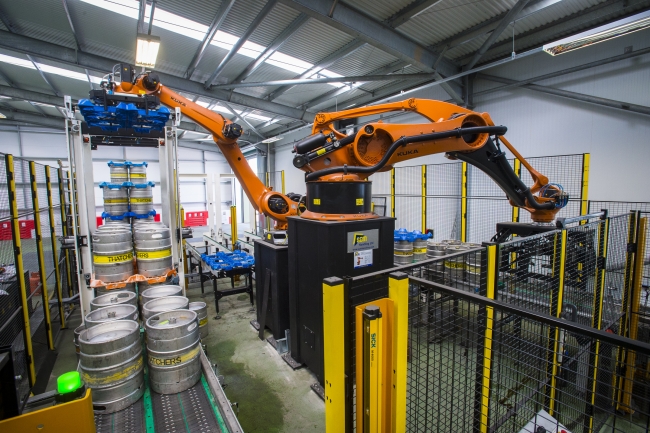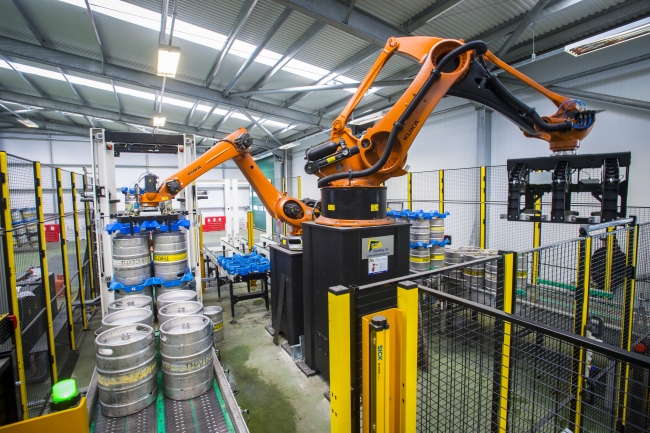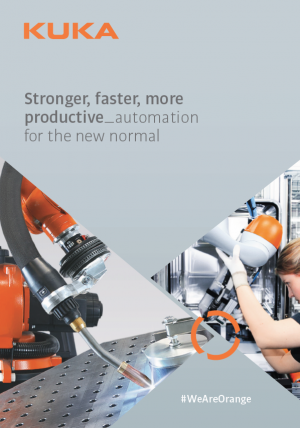3 minute read • published in partnership with KUKA
Case Study: How robots helped Thatchers Cider reduce forklift movements by 50%
Family-owned cider maker, Thatchers, delivers product all over the UK. The company turned to robots to improve consistency and efficiency, cutting forklift truck movements by over 50%.
Thatchers Cider Company Ltd, based in Somerset in south-west England, remains family-owned more than a century after it was founded. It farms 500 acres of its own orchards and also buys in apples from nearby growers.
Being family-owned does not mean that Thatchers is a prisoner of tradition. It has developed a novel way of growing apple trees including training along wires, in hedgerow style. These linear orchards offer improved growing and harvesting conditions, for which it developed a bespoke machine.
Thatchers presses up to 500 tonnes of apples a day. The cider can be matured in their own oak vats, before being packed into kegs for draught dispensing in pubs, bars and sports venues, or bottles and cans for retail outlets across the UK.

After investing in robots at its Somerset facility, Thatchers Cider reduced forklift truck movements by 50% / Picture: Thatchers Cider
Keg Handling: Improving efficiency and output
Empty kegs arriving at the production hall are stacked in 18-unit lots, with three layers of six kegs each. Gary Delafield, supply chain director, explains that the original keg loading and unloading was challenging as the forklift drivers had to split the 3 layers down and then place them accurately onto the production line to keep up with a 450 keg per hour line speed.
Gary believed that the solution to improving the efficiency of this process would be automation.
He approached SCM Handling, a company local to Thatchers, known for paper and similar materials handling solutions, and explained the current operation. From this discussion and subsequent site visits, the SCM team designed a bespoke solution that had a variety of automation, including two Kuka robots at its core to deal with the challenge.
Two robots for efficiency and accuracy
SCM Handling built the cell around two robots, which easily keep up with the line speeds, improved health and safety and had a higher repeatability. The two robots are: the KUKA KR 120, which picks up the layer boards that sit between each six-pack layer of kegs, and the 700kg payload KR 700 PA, which picks up and stacks the kegs. The KR 700 has a high reach of 3320mm, specified because of existing conveyor heights.
Gary explained that the forklift drivers now only deal with stacks of 18 kegs rather than having to split down and handle sixes.
This means Thatchers’ loading/unloading process is now safer, more reliable and, most importantly: more efficient. Empty stacks of 18 kegs are moved from lorries to the loading end of the cell. A centralising unit squares them up before the KUKA KR 120 removes the layer board, allowing the KR 700 to lift six kegs at a time and place them onto the conveyor, for inspection and cleaning before being refilled.
But there’s more.
The cell is two-sided. Full kegs arrive on the opposite side, ready to be stacked back into 18s. The KR 700 swings through 180 degrees from the incoming conveyor to the outbound side and stacks the kegs, whether 30 or 50 litres, and the KR 120 precisely positions the layer board in between layers. Once stacked, the kegs are ready to be taken by forklift truck and loaded onto the waiting lorry
The automated cell has been a great success since it was installed, in 2014. The sensors and programming of the robots ensure that each layer of six kegs – and the intervening layer boards are precisely positioned, which eliminates the risk of toppling that can happen when stacking with forklifts.

The robots at Thatchers Cider also improved keg handling efficiency and output / Picture: Thatchers Cider
Service and support
“SCM has worked with us closely throughout, designing and installing the handling tools and moving the robots and cell location on multiple occasions, as we have expanded our production capacity,” says Gary. “They have provided great service; they can dial in remotely to assess and solve any problems, quickly.”
The cell has been so successful that Thatchers purchased a further three KUKA robots when they installed their new canning facility.
Gary explains how the robots can be modified as the job develops.
“This really is the beauty of robotics,” he adds. “SCM sold us one machine but we have already moved and reprogrammed it multiple times to suit different line layouts. The stacking head is quite a specialised tool and, with kegs being returnable, they can have a hard time but, as far as machines go, it’s a great improvement.”
This case study is part of an extensive industry report produced by KUKA that can be downloaded below.
